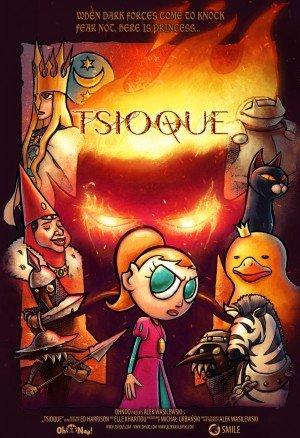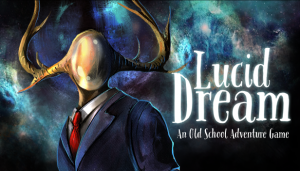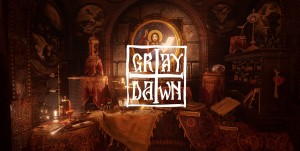Review for The Works of Mercy
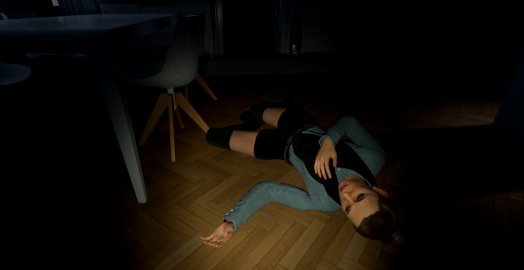
People are terrible and they deserve to be punished – if you are to trust the message behind The Works of Mercy. But surely not all are corrupt, and for that matter, what about being innocent until proven guilty? Well, despite all its surrealist and philosophic obfuscation, this first-person 3D thriller frames a case about the nature of humanity so biased and riddled with fallacies that it couldn't rightfully be called an argument. And sadly, there isn't much else beyond that except highly diluted gameplay that just doesn't engage in any meaningful way.
Set completely within the rooms of the protagonist's apartment except for a couple short trips through psychedelic hospital hallways, a dreary forest, and a confining basement, your jaunt through this dark psychological adventure begins without fanfare as you stand facing a desk covered with pencil sketches. Soon the phone starts to ring and once you answer, events are set in motion. The caller refers to himself as Eugen, and no he isn’t inquiring about the missing letter from his name but rather forewarns that he holds your wife and child captive with the intent of doing them harm unless you satisfy his demands. Frankly, Eugen wants you to kill some people. He is trying to teach you a lesson of some kind, presumably about guilt and mercy, but the message is so muddied by the end that the whole thing is likely to leave you with an overwhelming urge to shrug your shoulders.
Gameplay is as basic as walking around until an event triggers and selecting from a list a dialogue options that automatically pops up in response to breaks in clumsy voice performances. The first-person, free-roaming perspective is meant to connect you with the protagonist’s circumstances and challenge your resolve during moral dilemmas, yet your greatest challenge will be memorizing phone numbers for a few seconds as you run to the dial pad. Or holding back a sigh as you realize that yes, this is the run speed. You can manipulate interactive objects by holding down right-click and sliding the mouse about, but this is never mandatory. Turn on faucets, open the fridge, flip light switches that apparently aren't wired to anything, throw books around the place... there's only so much fun we can make for ourselves when the game isn't meeting us the rest of the way.
Near the entrance to the apartment is a framed list of tasks split into two categories: Spiritual Works and Corporal Works. You will notice a check mark appear beside each item as you complete objectives, or an "X" if you mess them up. It isn't so much an issue that the descriptions of each goal are relatively vague, but that you aren't given enough foresight about how to achieve them. For instance, I have no idea when "Feed the hungry" might have become pertinent because it remained blank at the end of the game. I even granted someone an apple (albeit a poisoned one) and still the list was unaltered.
Indeed, I completed The Works of Mercy twice and will not go back for thirds. I played it a second time only to observe the effects of dialogue choices and whether there were multiple endings. During my first playthrough I tried hard not to bring harm to any characters, and in the second go-around I did everything I could feasibly do to engage in murderous behavior, as Eugen encouraged, only for him to berate me by saying "You need to trust me more," as if I was going against his wishes. Thus, my second playthrough became an even more frustrating experience, revealing how fruitless player choices are.
(Minor spoiler alert) Try as you might to resist Eugen, there comes a point when you have no option but to commit murder. Upon learning that a woman is locked in your wardrobe, you are instructed to use a power tool to drill through the furniture and victim alike. Overlooking how improbable it would be to kill someone with an ordinary sized drill bit through a wooden door, you must choose between two options: tell her to move over or murder her outright. Except no, they both kill her. My annoyance here derives from the fact that I sidestepped violence all the way up until this moment and I still can't tell if her death was a result of a bug or if The Works of Mercy doesn't actually care about player choice. For that matter, you might even bumble your way into an accidental murder because the game neglected to share necessary information. I swear, officer, I didn't know that interacting with that guy repairing my satellite dish meant I'd push him off the ledge to his death! (End spoiler)
In any case, I don't see the moral struggle here, just a bunch of characters you know almost nothing about dying for a wife and daughter you know even less about, followed by none-too-subtle reveals that your character has committed terrible acts in the recent past. That in mind, the biggest plot twist of the game is awfully predictable and if you are familiar with psychological horror stories you've likely seen it before.
Apart from being bound by the burden of "to kill" or "not to kill," you get to decide if that call girl you're about to request is either skinny or curvy; say "amen" or "shut up" in response to a prayer; admonish or forgive an abusive father; and invite in or turn away a frantic man trying to escape what is stalking him. Most choices hardly lead anywhere, but some check off items on the aforementioned list. It appears that the ultimate result is determining which of the (I believe) two endings you attain, but playing differently in my respective playthroughs led me to the same ending regardless. Actually, I looked up the alternate ending via YouTube and can tell you it's not worth the effort, especially since there is no save function at all to help in your pursuit. Neither finale serves as a proper conclusion for anything that has transpired, just as abrupt stopping points that last all of a few brief seconds before the credits roll.
At about an hour in length, it may not be a huge inconvenience that the developers excluded even an autosave file, but it's a definite oversight in an age in which we have become accustomed to shutting off games expecting that our progress will be retained. This assumption is how I discovered, forty minutes in, that exiting was a mistake and I'd have to start my playthrough from scratch.
Visually The Works of Mercy plays out like a lucid dream, occasionally emphasizing this by adopting a nauseating, wobbly distortion filter. Otherwise, the graphics aim for photorealism and for the most part they succeed, at least in terms of environments. Character models are of considerably lower quality, looking out of place in their environments. Given the subject matter, the amount of gore presented is less than I anticipated, as only a single character death is particularly bloody.
While the game performs fine, I ran into a few bugs and visible flaws on top of the dated character animations: evident texture seams, misaligned splash effects when running water, characters blinking their eyes when they're supposed to be dead. On the auditory side, I encountered dialogue doubling over itself. Then there's the fact that voices and subtitles don’t always match up. We're talking about an incredibly short game here, which means there are even fewer justifications for such a lack of polish.
Music takes a backseat to silence, but it suits the intended tone once it does kick in. Contrarily, voice acting is near constant and further weakens an already poor script. When an actor portrays a depressed character by sounding like an impersonation of Eeyore from Winnie the Pooh, it becomes difficult to take the serious story seriously. Another person who is yelling at you from the other side of a door seems as if he is trying his best to hold back, as if the actor recorded his dialogue in a library. Eugen's actor is off-kilter and obnoxious in a way that fits his character, though still unpleasant to listen to.
The Works of Mercy was obviously not written by native English speakers and the translation is barely adequate, at times unintentionally humorous. Furthermore, the script tosses around phrases of implied significance which invariably ring hollow – prime example being the recurring line: “monsters don’t have reflections in mirrors.” I'm almost convinced this quote is an excuse for the developers to bypass the inclusion of character reflections in the mirrors spread about the apartment. So when you look into a mirror and notice you have no reflection, that means you're the monster. Because, remember, people are terrible. Even when you're trying to do good and spare lives.
I'd never be one to turn violence in video games into a political topic, so if the goal was instead to create some kind of twisted fantasy-fulfillment-murder-simulator then I have no qualms, except that even then The Works of Mercy lacks the clever gameplay mechanics and calculated flippancy for this to be achieved.
As a lifelong fan of horror, you could say I'm desensitized, which no doubt contributed to me feeling unfazed by this story of brutality and murder, but I would also point to the game's misguided approach to the subject matter. The cruelty and vileness are much too forced to be shocking – swiftly becoming dull – and the writing is consistently tone deaf. The Works of Mercy has plenty of ideas and shows a vague indication of what could have been a unique David Lynch-meets-Saw thriller, but ultimately doesn't know how to convey itself in an appropriately engaging manner.



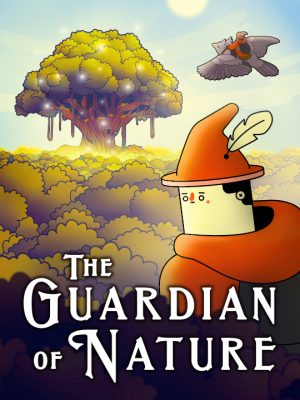
__large.png)




